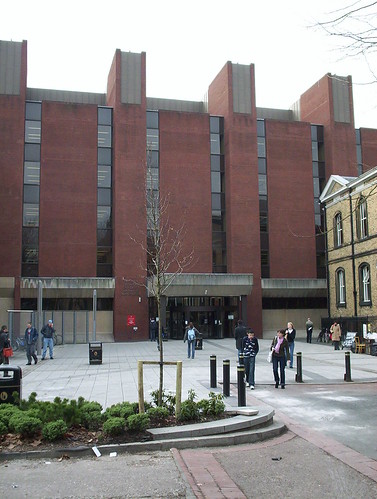 My eye was caught by an article on the BBC about libraries vs. the internet (http://www.bbc.co.uk/news/magazine-12340505). If I imagine the places I would go to feel 'at home', the library would be top of the list. From Luton public library, where as a teenager I worked my way through the record and sheet music section (before Spotify!) to Manchester's Henry Watson Music library - which is famously significant for so many musicians, to Manchester University's John Rylands library (where I spend much of my time now), all of the attributes of home and 'dwelling' are found in libraries. There is a degree of privacy and intimacy in a library which is curiously absent when I am browsing the web. But how can that be? Does that mean there is something about the phenomenon of privacy and intimacy which is distinct from being 'personal' or 'alone'?
My eye was caught by an article on the BBC about libraries vs. the internet (http://www.bbc.co.uk/news/magazine-12340505). If I imagine the places I would go to feel 'at home', the library would be top of the list. From Luton public library, where as a teenager I worked my way through the record and sheet music section (before Spotify!) to Manchester's Henry Watson Music library - which is famously significant for so many musicians, to Manchester University's John Rylands library (where I spend much of my time now), all of the attributes of home and 'dwelling' are found in libraries. There is a degree of privacy and intimacy in a library which is curiously absent when I am browsing the web. But how can that be? Does that mean there is something about the phenomenon of privacy and intimacy which is distinct from being 'personal' or 'alone'? This may be the case. Maybe it depends on what we think thinking is, and what we think the difference between 'intimate' thinking and being and 'public' thinking. (this is very reminiscent of the blog posts I made a couple of years ago about the difference between public and private: see http://dailyimprovisation.blogspot.com/2008/04/public-space-1.html). I've been thinking a lot about Edwin Hutchin's work on cognition. I've been making an argument based on Hutchins that "thinking isn't in the head": the brain regulates a continuous process of interaction with a material and social environment, with the viable operation of individual biology. Under these circumstances, the material environment is causal in this regulatory process. Thought and the environment within which thought occurs are not separable. This has implications for our thinking about 'home'. Whether homeliness and intimacy and privacy are 'in' the material environment of libraries or drawing rooms or bedrooms (which is clearly problematic), what happens in the inter-relationships between individuals in a society (which creates and maintains the environment) and particular material forms (like libraries) is a common and real experience. Destroy the libraries and you destroy part of the thinking of those individuals. You may destroy something of the thinking for generations to come (but this is more complex, for we are always immersed in history which too is part of our thought). The latter I find particularly dangerous.
This may be the case. Maybe it depends on what we think thinking is, and what we think the difference between 'intimate' thinking and being and 'public' thinking. (this is very reminiscent of the blog posts I made a couple of years ago about the difference between public and private: see http://dailyimprovisation.blogspot.com/2008/04/public-space-1.html). I've been thinking a lot about Edwin Hutchin's work on cognition. I've been making an argument based on Hutchins that "thinking isn't in the head": the brain regulates a continuous process of interaction with a material and social environment, with the viable operation of individual biology. Under these circumstances, the material environment is causal in this regulatory process. Thought and the environment within which thought occurs are not separable. This has implications for our thinking about 'home'. Whether homeliness and intimacy and privacy are 'in' the material environment of libraries or drawing rooms or bedrooms (which is clearly problematic), what happens in the inter-relationships between individuals in a society (which creates and maintains the environment) and particular material forms (like libraries) is a common and real experience. Destroy the libraries and you destroy part of the thinking of those individuals. You may destroy something of the thinking for generations to come (but this is more complex, for we are always immersed in history which too is part of our thought). The latter I find particularly dangerous.But all this only holds true if something like Hutchin's mechanism is correct. I think it is. If we hold to 'traditional' cognitive formulations which see 'brains in vats' or 'brains as computers', then there is no consequence to the destruction of libraries (or any other part of the material environment). By taking a position on cognition which agrees with Hutchins, we take a political position. Our thoughts and knowledge are tied up with our environment. We must fulfil our responsibilities to uphold knowledge by acting as custodians of the environment within which knowledge is maintained through the thoughts of those who inhabit it. For knowledge, thinking and the maintenance of civil society are entirely inter-dependent.

No comments:
Post a Comment